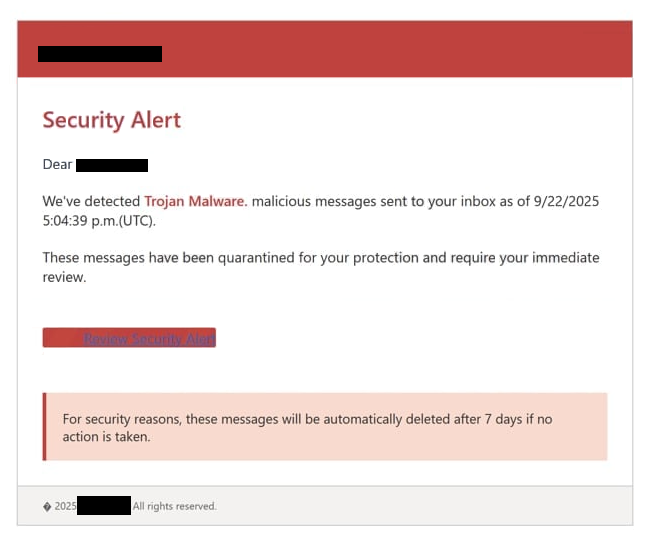Remove “Security Alert – We’ve Detected Trojan Malware” scam email
The “Security Alert – We’ve Detected Trojan Malware” email is part of a phishing campaign that tries to steal users’ email login credentials. The email is disguised as a security alert from the email service provider, and it informs you that a Trojan-type malware has been detected in a message sent to you. The message has supposedly been quarantined for your protection, but it requires your immediate review. However, this email is nothing more than a phishing attempt, and its contents are false. If you were to click on the provided link, you would be taken to a phishing site that imitates the Gmail login page. If you were to enter your login credentials on this site, they would be stolen by the malicious actors behind this phishing campaign.
This “Security Alert – We’ve Detected Trojan Malware” email is a very clear phishing attempt. It’s becoming increasingly common for malicious actors to disguise phishing emails as notifications about issues with users’ email accounts. In this particular case, the issue is supposedly malicious emails sent to you. If you were to believe the email, you received an email with a Trojan in it, but it’s been quarantined for your protection. The email asks that you review the email immediately by clicking on the provided button. However, clicking on any of the buttons in the email would redirect you to a phishing website designed to steal your email login credentials. Entering your credentials on this site would send them to the malicious actors operating the phishing campaign.
Email credentials are very valuable to cybercriminals for several reasons. Many users use the same email addresses for years, which means the accounts accumulate significant amounts of personal and sensitive information if old emails are not regularly deleted. This data can be exploited for purposes like blackmail or extortion. Furthermore, email accounts are often linked to numerous other accounts. Accessing an email account could provide access to those connected accounts as well.
If you’ve opened this phishing email, clicked on the link, and entered your login details, it’s essential to change your password right away. If your account is already compromised and you can’t access it, make sure to try all possible account recovery options. If recovery doesn’t work, it’s important to unlink the compromised email address from any connected accounts to stop further unauthorized access.
The full “Security Alert – We’ve Detected Trojan Malware” phishing email is below:
Subject: – Security Alert
–
Security AlertDear –
We’ve detected Trojan Malware. malicious messages sent to your inbox as of 9/22/2025 5:04:39 p.m.(UTC).
These messages have been quarantined for your protection and require your immediate review.
Review Security AlertFor security reasons, these messages will be automatically deleted after 7 days if no action is taken.
2025 -. All rights reserved.
Unsubscribe from quarantine notifications | Security Settings
Signs of a phishing email
Exercise caution with unsolicited emails, particularly those urging you to click on links or open attachments, if you want to avoid becoming a victim of malware or a phishing attack. Critically evaluate their content to determine if it even makes sense. For instance, this “Security Alert – We’ve Detected Trojan Malware” is clearly a phishing attempt, as email service providers neither send such alerts nor quarantine emails.
Before interacting with any unsolicited email, check the sender’s email address. If the sender claims to represent a reputable company but the email address appears random or unprofessional, it is likely malicious. Even when the address seems legitimate, verify that it genuinely belongs to whomever the sender claims to be. You can do this through a quick online search. Malicious actors may employ deceptive tactics to make email addresses appear credible, such as substituting characters with similar-looking ones (e.g., “rn” instead of “m”) or adding extra characters. In some cases, spoofing techniques are used to make emails appear as though they originate from the recipient’s own account. However, in this particular case, the “Security Alert – We’ve Detected Trojan Malware” is sent from an obviously fake account, as it does not use a domain owned by Google.
Additionally, malicious emails often contain numerous grammar and spelling mistakes, which can serve as red flags when assessing whether the emails were sent by legitimate senders. While some phishing attempts, like the “Security Alert – We’ve Detected Trojan Malware” email, may not have obvious spelling mistakes, awkward phrasing is still noticeable. The email also addresses the recipient using their email username, which is another giveaway. All emails sent to you by your email provider will address you by the name you used when creating an account.
Take the time to thoroughly review emails and avoid hastily clicking on links or opening attachments. Hover over buttons to preview their destinations before clicking, and always scan unsolicited attachments using antivirus software or VirusTotal.
Site Disclaimer
WiperSoft.com is not sponsored, affiliated, linked to or owned by malware developers or distributors that are referred to in this article. The article does NOT endorse or promote malicious programs. The intention behind it is to present useful information that will help users to detect and eliminate malware from their computer by using WiperSoft and/or the manual removal guide.
The article should only be used for educational purposes. If you follow the instructions provided in the article, you agree to be bound by this disclaimer. We do not guarantee that the article will aid you in completely removing the malware from your PC. Malicious programs are constantly developing, which is why it is not always easy or possible to clean the computer by using only the manual removal guide.

